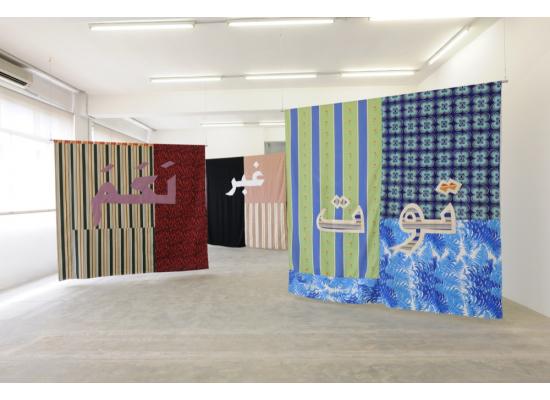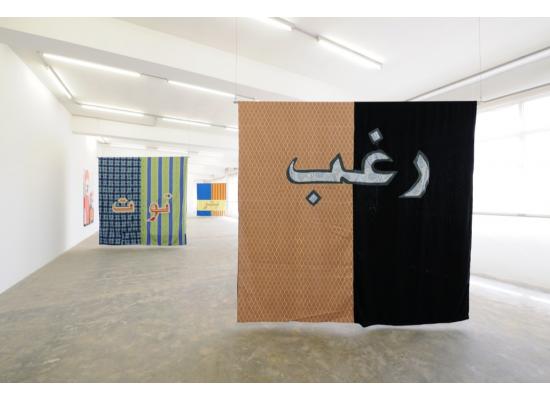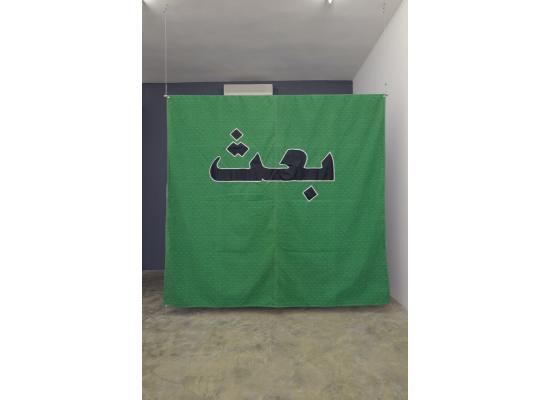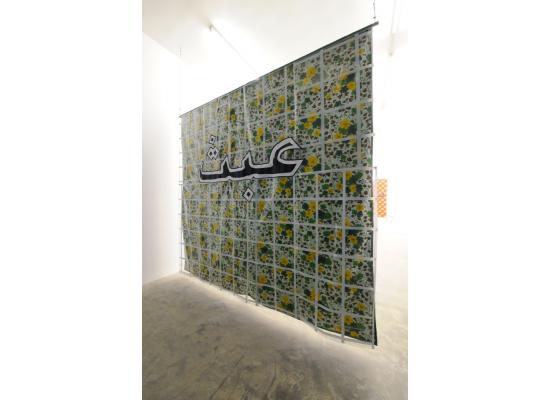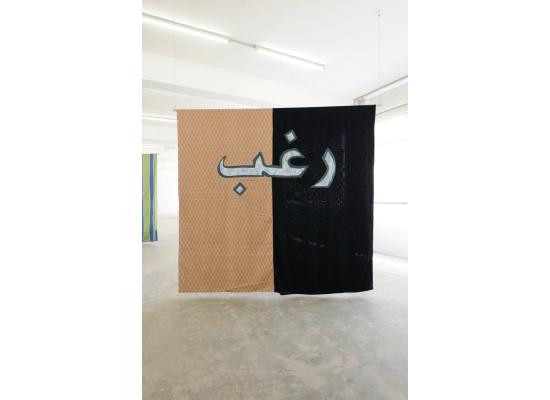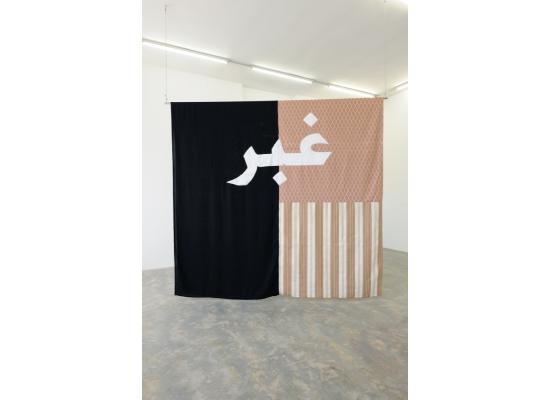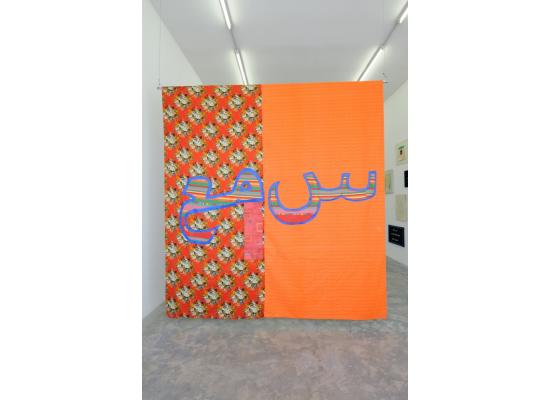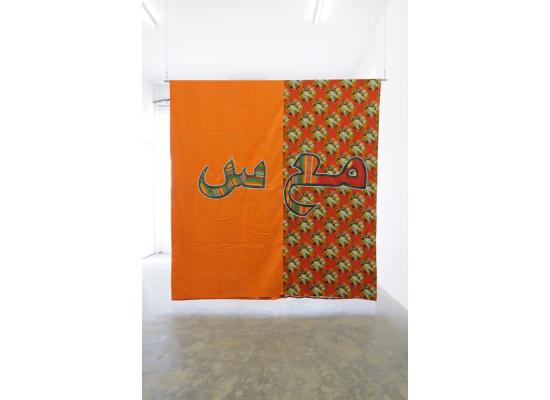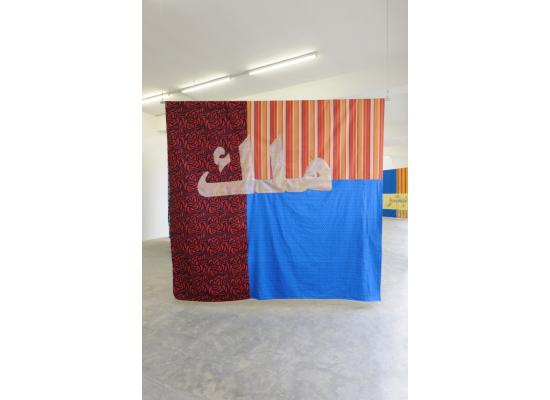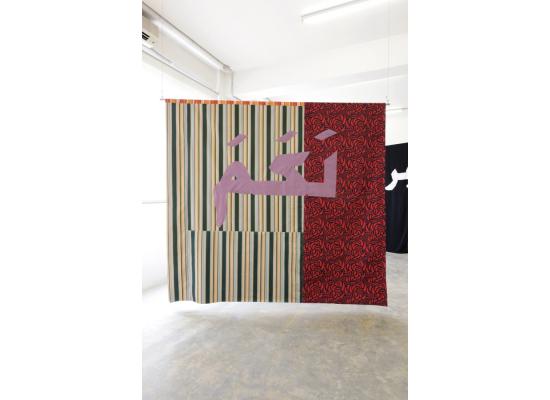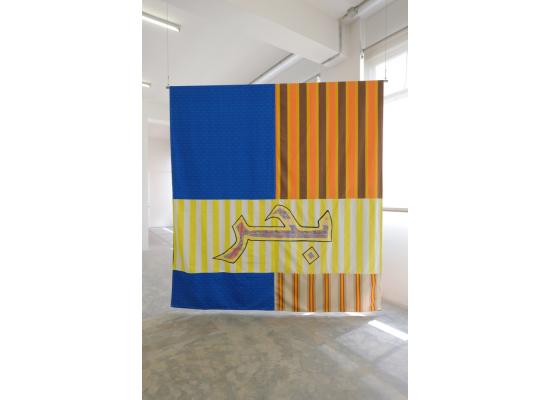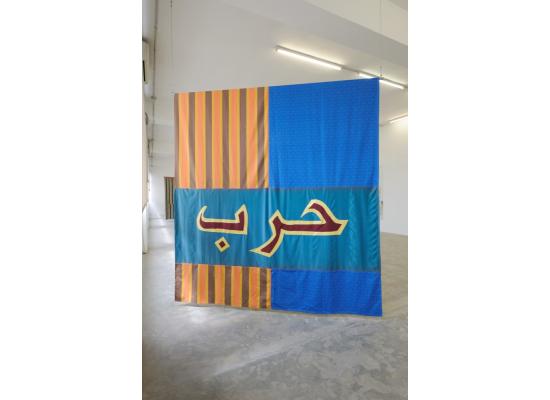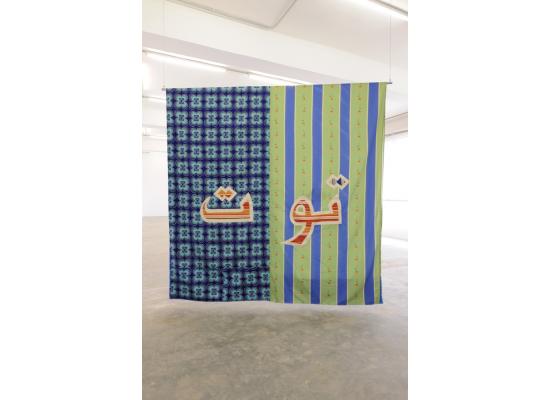These huge suspended double-sided patchworks are a playful reflection suspended between space and language based on the three letter word roots in the Arabic language. These suspended-like reflections are resulting from a linguistic research based on readings of Lebanese sociologue and linguist Ahmad Beydoun.
In his chapter “the imaginary of letters", Beydoun compares the meaning and origin as well as the choice of Arabs for certain letters and how these are pronounced and what meaning they generate, comparing and denying at once thoughts on the meaning of letters by Al Alayli and Al Chidyyaq, both prominent Lebanese linguists and translators.
Why did Arabs choose the letter “m” where lips are bound together for plural for instance? And “n” for indicating the female plural for instance? Etc,..
On each side of each suspended patchwork we read a three-letters’ word, often allowing different readings of the same word.
Here below are the details:
1- Raghab/Ghabar : Raghab, or Raghiba means desire, or to desire), the three letters are shuffled around and we read Ghabar, which means dust, or to vanish.
2- Malik/Lakam : on the first side of this curtain we read Malik, or malaka, which means the king, or to own, and the letters MLK are the base of Ahmad Beydoun’s book where he states that the letters KLMN in the Arabic alphabet came in the same sequence of the same letters in the Syriac alphabet and the Phoenician, and many following alphabets have kept the same order of those letters in their alphabets, such as the Greeks and the Arabs. He states that the word “Elementum” in latin was constructed in that way, according to Georges Mounin in Histoire de la linguistique. So it’s as “KLMN” is the elementum of language, and therefore in Arabic it names “Al Kalam” in Arabic which means words or more broadly language in this case. And therefore a king “Malik” is very proud to have the three letters MLK in his name, he will be like the king of kings according to what Arabs tell.
The second side of this curtain “Lakam” or “Lakm” means to punch, and that is a word constructed by shuffling around the three letters of the King’s name in Arabic. Lakam alludes to our current kings and their totalitarian behaviors.
3- Tout/Tout : Less common and not really known is "Tout" as the first month in the coptic year. But most commonly Tout in Arabic means berries, and Tout is the sound of sensorship of bad words on TV for instance. Tout is also an onomatopoeia for a car's horn.
4- Baher/Hareb : this is the most simple and childish word play amongst the patchworks curtains, on one side we read "Sea", on the other we read "War".
5- Samaa/Maas : Samaa is listening or to listen, it is also related to music, or to obedience, or patience (among many other meanings). Maas means to smash most commonly, but it also means to have a sexual intercourse (not common or not so known meaning). Maas is also related to work on skins of sheep.
6- Baath/Aabath : to give the most simple and common meaning of Baath, we can explain it as to emanate, it also means the day of the Qiyamah, but also, it is the name of the Baath party. Aabath means Absurd according to the most common meaning in Arabic. As for Baath, here is a more detailed explanation in Arabic according to Lissan Al Aarab encyclopedic dictionnary:
بَعَثَهُ يَبْعَثُه بَعْثاً أَرْسَلَهُ وَحْدَه وبَعَثَ به أَرسله مع غيره وابْتَعَثَه أَيضاً أَي أَرسله فانْبعَثَ وفي حديث عليّ يصف النبي صلى الله عليه وسلم شَهِيدُك يومَ الدين وبَعِيثُك نعْمة أَي مَبْعُوثك الذي بَعَثْته إِلى الخَلْق أَي أَرسلته فعيل بمعنى مفعول وفي حديث ابن زَمْعَة انْبَعَثَ أَشْقاها يقال انْبَعَثَ فلانٌ لشأْنه إِذا ثار ومَضَى ذاهباً لقضاء حاجَته والبَعْثُ الرسولُ والجمع بُعْثانٌ والبَعْثُ بَعْثُ الجُنْدِ إِلى الغَزْو والبَعَثُ القومُ المَبْعُوثُونَ المُشْخَصُونَ ويقال هم البَعْثُ بسكون العين وفي النوادر يقال ابْتَعَثْنا الشامَ عِيراً إِذا أَرسَلوا إِليها رُكَّاباً للميرة وفي حديث القيامة يا آدمُ ابْعَثْ بَعْثَ النار أَي المَبْعُوث إِليها من أَهلها وهو من باب تسمية المفعول بالمصدر وبَعَثَ الجُنْدَ يَبْعَثُهم بَعْثاً وجَّهَهُمْ وهو من ذلك وهو البَعْثُ والبَعِيثُ وجمع البَعْثِ بُعُوث قال ولكنَّ البُعُوثَ جَرَتْ علينا فَصِرْنا بينَ تَطْوِيحٍ وغُرْمِ وجمع البَعِيثِ بُعُثٌ والبَعْثُ يكون بَعْثاً للقوم يُبْعَثُون إِلى وَجْهٍ من الوجوه مثل السَّفْر والرَّكْب وقولهم كنتُ في بَعْثِ فلانٍ أَي في جيشه الذي بُعِثَ معه والبُعُوثُ الجُيوش وبَعَثَه على الشيء حمله على فِعْله وبَعَثَ عليهم البَلاء أَحَلَّه وفي التنزيل العزيز بَعَثْنا عليكم عِباداً لنا أُولي بأْس شديد وفي الخبر أَنَّ عبد المَلِك خَطَبَ فقال بَعَثْنا عليكم مُسلِمَ بن عُقْبة فَقَتلَكم يوم الحَرَّة وانْبَعَثَ الشيءُ وتَبَعَّثَ انْدَفَع وبَعَثَه من نَوْمه بَعَثاً فانْبَعَثَ أَيْقَظَه وأَهَبَّه وفي الحديث أَتاني الليلةَ آتِيانِ فابْتَعَثَاني أَي أَيقَظاني من نومي وتأْويلُ البَعْثِ إِزالةُ ما كان يَحْبِسُه عن التَّصَرُّف والانْبِعاثِ وانْبَعَثَ في السَّيْر أَي أَسْرَع ورجلٌ بَعِثٌ كثير الانْبِعاثِ من نومه ورجل بَعْثٌ وبَعِثٌ وبَعَثٌ لا تزال هُمُومه تؤَرِّقُه وتَبْعَثُه من نومه قال حُمَيْدُ بن ثَوْر تَعْدُو بأَشْعَثَ قد وَهَى سِرْبالُه بَعْثٍ تُؤَرِّقُه الهُمُوم فيَسْهَرُ والجمع أَبْعاث وفي التنزيل قالوا يا وَيْلَنا مَنْ بَعَثَنا من مَرْقَدِنا ؟ هذا وَقْفُ التَّمام وهو قول المشركين يوم النُّشور وقولُه عز وجل هذا ما وَعَدَ الرحمنُ وصَدَقَ المُرْسَلون قَوْلُ المؤْمِنين وهذا رَفْعٌ بالابتداء والخَبَرُ ما وَعَدَ الرحمنُ وقرئ يا وَيْلَنا مَنْ بَعَثَنا مِن مَرْقَدِنا ؟ أَي مِن بَعْثِ الله إِيَّانا من مَرْقَدِنا والبَعْثُ في كلام العرب على وجهين أَحدهما الإِرْسال كقوله تعالى ثم بَعَثْنا من بعدهم موسى معناه أَرسلنا والبَعْثُ إِثارةُ باركٍ أَو قاعدٍ تقول بَعَثْتُ البعير فانبَعَثَ أَي أَثَرْتُه فَثار والبَعْثُ أَيضاً الإِحْياء منالله للمَوْتى ومنه قوله تعالى ثم بَعَثْناكم من بَعْدِ موتِكم أَي أَحييناكم وبَعَثَ اللمَوْتى نَشَرَهم ليوم البَعْثِ وبَعَثَ اللهُ الخَلْقَ يَبْعَثُهُم بَعْثاً نَشَرَهم من ذلك وفتح العين في البعث كله لغة ومن أَسمائه عز وجل الباعِثُ هو الذي يَبْعَثُ الخَلْقَ أَي يُحْييهم بعد الموت يوم القيامة وبَعَثَ البعيرَ فانْبَعَثَ حَلَّ عِقالَه فأَرسله أَو كان باركاً فَهاجَهُ وفي حديث حذيفة إِنَّ للفِتْنةِ بَعَثاتٍ ووَقَفاتٍ فمن اسْتَطاعَ أَن يَمُوتَ في وَقَفاتِها فَلْيَفعل قوله بَعَثات أَي إِثارات وتَهْييجات جمع بَعْثَةٍ وكلُّ شيء أَثَرْته فقد بَعَثْته ومنه حديث عائشة رضي الله عنها فبَعَثْنا البَعيرَ فإِذا العِقْدُ تحته والتَّبْعاثُ تَفْعال مِن ذلك أَنشد ابن الأَعرابيّ أَصْدَرها عن كَثْرَةِ الدَّآثِ صاحبُ لَيْلٍ حَرِشُ التَّبْعاثِ وتَبَعَّثَ مني الشِّعْرُ أَي انْبَعَثَ كأَنه سالَ ويومُ بُعاثٍ بضم الباء يوم معروف كان فيه حرب بين الأَوْسِ والخَزْرج في الجَاهلية ذكره الواقدي ومحمد بن إِسحق في كتابيهما قال الأَزهري وذكَرَ ابن المُظَفَّر هذا في كتاب العين فجعلَه يومَ بُغَاث وصَحَّفَه وما كان الخليلُ رحمه الله لِيَخفَى عليه يومُ بُعاثٍ لأَنه من مشاهير أَيام العرب وإِنما صحَّفه الليثُ وعزاه إِلى الخَليل نفسِه وهو لسانُه والله أَعلم وفي حديث عائشة رضي الله عنها وعندها جاريتان تُغَنِّيانِ بما قِيل يومَ بُعَاثٍ هو هذا اليوم وبُعاثٌ اسم حِصن للأَوْس وباعِثٌ وبَعِيثٌ اسمان والبَعِيثُ اسم شاعر معروف من بني تميم اسمه خِدَاشُ بن بَشيرٍ وكنيته أَبو مالك سمي بذلك قوله تَبَعَّثَ مني ما تَبَعَّثَ بعدما اسْ تَمرَّ فؤَادي واسْتَمَرَّ مَرِيري قال ابن بري وصواب إِنشاد هذا البيت على ما رواه ابن قُتَيْبة وعيره واستَمَرَّ عَزِيمي قال وهو الصحيح ومعنى هذا البيت أَنه قال الشعر بعدما أَسَنَّ وكَبِرَ وفي حديث عمر رضي الله عنه لما صالَحَ نصارَى الشام كتبوا له إِنَّا لا نُحْدِثُ كنيسةً ولا قَلِيَّة ولا نُخْرِج سَعانِينَ ولا باعوثاً الباعوثُ للنَّصارى كالاستسقاء للمسلمين وهو اسم سرياني وقيل هو بالغين المعجمة والتاء فوقها نقطتان وباعِيثا موضع معروف
